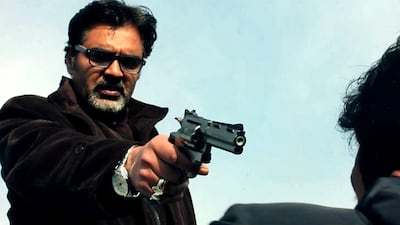When Hussein Khan was a boy growing up in Srinagar, he would see film crews from other parts of India flock to Kashmir to shoot in its mountains, orchards and valleys. Sometimes he could visit the sets of as many as four films in the space of a single day.
After 1989, however, militant armed separatists began to ravage Kashmir. The movie crews stopped coming, and Kashmiris themselves were too preoccupied with the precariousness of everyday life to nurture any local film industry. “So there was never a chance to establish a sense of cinema here,” said Mr Khan, 49.
That may now be changing. On Friday, Mr Khan’s new film, “Kashmir Daily,” was released in five cities across India — the first production from the region ever to be seen in theatres outside the region.
Even a film buff like Mr Khan struggles to remember other films made in Kashmir by Kashmiris. He can recall Mainz Raat ("Wedding Night") from 1964 and two others from the last ten years. More recent movies — including "Kashmir Daily" — were only screened a handful of times in auditoriums in Srinagar, a city which has lost all its commercial cinema theatres.
“Kashmir Daily,” shot in both Kashmiri and Hindi, tells the story of a crusading journalist running into the twin problems of youth unemployment and drug addiction. The idea for the story came to Mr Khan when he reported on such problems during his own time as a journalist in the early 2000s. He switched from journalism to making advertising films but the plot for his film stayed in his mind. He found little encouragement,though, even from his friends. How would he finance the film? Who would watch it?
Then in 2012, via a heated Facebook discussion about film, Mr Khan met Mir Sarwar, a Mumbai-based actor of Kashmiri origin. Sarwar was on the cusp of a Bollywood career, but he too dreamed of a revival of cinema in Kashmir. They agreed to collaborate.
It took four years to make the film. “I talked to friends of mine who act in the theatre, and they agreed to do the movie, even though we could only pay them much later,” said Sarwar, 40. said. ”It was the same with the people who leased us the equipment. Everyone did it just on the strength of personal relations.”
Whatever money Mr Khan earned from making advertising films, he ploughed into “Kashmir Daily.” He asked friends for loans and kept the cast small: just ten for the major roles. He even acted in it himself.
"People think film crews always have 100 or 200 people,” Sarwar said. “At times, though, it would just be Hussein Khan and me going off and shooting somewhere. We both know how to work a camera, so one of us would shoot when the other was acting.” The project was so short on resources that when Mr Khan needed a coat for one scene, Sarwar simply took off his own and draped it around his director’s shoulders.
Like the cast and shooting crew, the post-production team was also comprised entirely of Kashmiris. Once finished, “Kashmir Daily” was shown last March, twice daily for two weeks, at a Srinagar convention hall owned by the Jammu & Kashmir tourism department.
“People wanted to see the movie again and again, but we weren't able to set up more screenings,” Sarwar said. Hungry to get the film out to more people, Mr Khan began to meet with film distributors elsewhere in India and finally placed “Kashmir Daily” in the hands of the multiplex chain PVR.
For a Kashmiri film to even be on release in theatres is encouraging, Sarwar said. “Back home, people don’t really think of acting as a career. When I first moved to Delhi to begin modelling and acting in theatre, people in Srinagar would say: ‘What is this boy doing? Why doesn’t he get a real job?’”
Mr Khan hopes “Kashmir Daily” would convince film crews to resume shooting movies in the region again. The last two years in the Kashmir valley have been tense, he admitted. Clashes involving civilians, militants and security forces claimed 358 lives in 2017, more than any other year this decade.
“But things have started to quieten down,” Mr Khan said. “It’s important for people to come here to learn our stories. And equally, it’s important for us to tell the world our story. That’s what we want to do with this film.”

